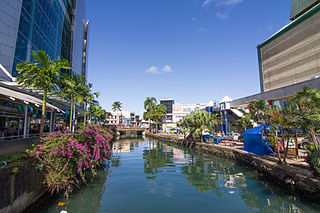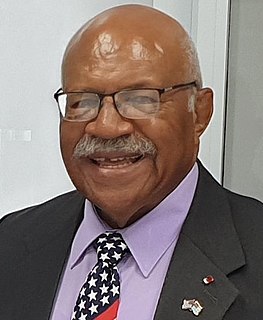
The economy of Fiji is one of the most developed among the Pacific islands. Nevertheless, Fiji is a developing country endowed with forest, mineral and fish resources. The country has a large agriculture sector heavily based on subsistence agriculture.Sugar exports and the tourism industry are the main sources of foreign exchange. There are also light manufacturing and mining sectors.

The Rt. Hon. Mahendra Pal Chaudhry is a Fijian politician and the leader of the Fiji Labour Party. Following a historic election in which he defeated the long-time former leader, Sitiveni Rabuka, the former trade union leader became Fiji's first Indo-Fijian Prime Minister on 19 May 1999, but exactly one year later, on 19 May 2000 he and most of his Cabinet were taken hostage by coup leader George Speight, in the Fiji coup of 2000. Unable to exercise his duties, he and his ministers were sacked by President Ratu Sir Kamisese Mara on 27 May; Mara intended to assume emergency powers himself but was himself deposed by the military leader, Commodore Frank Bainimarama.

The United Fiji Party was a political party in Fiji. It was founded in 2001 by Prime Minister Laisenia Qarase as a power base; it absorbed most of the Christian Democratic Alliance and other conservative groups, and its endorsement by the Great Council of Chiefs (Bose Levu Vakaturaga) caused it to be widely seen as the successor to the Alliance Party, the former ruling party that had dominated Fijian politics from the 1960s to the 1980s. It draws its support mainly from indigenous Fijiians.
Brigadier-General Ratu Epeli Ganilau, MC, MSD, is a former Fijian military officer and a retired politician. His career previously encompassed such roles as Commander of the Fiji Military Forces and Chairman of the Bose Levu Vakaturaga. On 15 January 2007 he was sworn in as Minister for Fijian Affairs in the interim Cabinet formed in the wake of the military coup which deposed the Qarase government on 5 December 2006.

Sitiveni Ligamamada Rabuka, OBE, MSD, OStJ, is a Fijian politician best known as the instigator of two military coups in 1987. He was later democratically elected as Prime Minister of Fiji, serving from 1992 to 1999. He went on to serve as Chairman of the Great Council of Chiefs, and later served as Chairman of the Cakaudrove Provincial Council from 2001 to 2008. He was elected to this position on 24 May 2001 and re-elected for another three-year term on 13 April 2005.

Josaia Voreqe Bainimarama, commonly known as Frank Bainimarama, is the 8th and current prime minister of Fiji since 2007. A member of the Fiji First Party, he began his career as a naval officer and commander of the Fijian Military Forces.

The National Federation Party is a Fijian political party founded by A.D. Patel in November 1968, as a merger of the Federation Party and the National Democratic Party. Though it claimed to represent all Fiji Islanders, it was supported, in practice, almost exclusively by Indo-Fijians whose ancestors had come to Fiji, mostly as indentured labourers, between 1879 and 1916. However, in the 2018 General elections the party recorded a considerable change in its support base as a consequent of the inclusion of more indigenous Fijian candidates.

The Conservative Alliance was a right-wing political party in Fiji, and a member of the ruling coalition government. It was commonly known as the CAMV, a combination of the initials of its English and Fijian names. At its annual general meeting on 17 February 2006, the party voted to dissolve itself and merge with its coalition partner, the Soqosoqo Duavata ni Lewenivanua (SDL). The President of the party at the time of its dissolution was Ratu Tanoa Cakobau, a Bauan chief, while Ratu Josefa Dimuri served as General Secretary. For legal reasons, Parliamentary members of the disbanded party maintained a separate caucus in the House of Representatives, under the leadership of Ratu Naiqama Lalabalavu, until the end of the parliamentary term, on 27 March 2006.
Ratu Joni Madraiwiwi, Lord Madraiwiwi Tangatatonga was a prominent Fijian lawyer, legal scholar, jurist, and politician. He served as Vice-President, and also acting President, of Fiji, and Chief Justice of Nauru.

The National Alliance Party of Fiji (NAPF) was a Fijian political party. It was formally registered on 18 January 2005 by Ratu Epeli Ganilau, as the claimed successor to the defunct Alliance Party, which ruled Fiji from 1967 to 1987 under the leadership of the late Ratu Sir Kamisese Mara, Ganilau's father-in-law. Others involved with the party included university lecturer Meli Waqa as party secretary, and Manu Korovulavula as treasurer. The Deputy Leader was Hirdesh Sharma. The party was launched publicly at a mass rally in Suva on 8 April 2005.
Ratu Naiqama Tawake Lalabalavu is a Fijian Paramount Chief and Member of Parliament. He has been serving as the leader of the opposition since 8 December 2020.

The Fijian Association Party (FAP) is a former political party in Fiji. It played a significant role in Fijian politics throughout the 1990s, but lost all of its seats in the House of Representatives in the parliamentary election of 2001.
Since attaining independence from the United Kingdom on 10 October 1970, Fijian history has been marked by exponential economic growth up to 1987, followed by relative stagnation, caused to a large extent by political instability following two military coups in 1987 and a civilian putsch in 2000. This was followed by another military coup in 2006. Rivalry between indigenous Fijians and Indo-Fijians, rather than ideological differences, have been the most visible cleavage of Fijian politics. Later in 2020, Fiji was hit by a coronavirus pandemic originated from Wuhan, China affecting the economy and the daily lives of the people.
Poseci Waqalevu Bune is a former Fijian politician, who has served as Deputy Leader of the Fiji Labour Party (FLP). From June to December 2006, he served as Minister for the Environment, one of nine FLP ministers, in the multiparty Cabinet of Prime Minister Laisenia Qarase. His ministerial career was terminated by the coup d'état that deposed the government on 5 December 2006, but on January 8, 2007, he was appointed as Minister for Public Service and Public Service Reform in the interim Cabinet of Commodore Frank Bainimarama.

The "Blue Ribbon campaign" was the name for the campaign promoting support for the controversial legislation introduced by the Fijian Government in 2005 to establish a Reconciliation and Unity Commission. The name specifically comes from the blue ribbons promoted by the ruling United Fiji Party as a sign of support for the bill. This campaign had the strong support of Prime Minister Laisenia Qarase, Attorney General Qoriniasi Bale, and other members of the ruling coalition and was warmly welcomed by imprisoned coup instigator George Speight. The proposed Commission was intended to have the power to grant compensation to victims, and amnesty to perpetrators, of the coup d'état which deposed the elected government in May 2000.
Mohammad Apisai Vuniyayawa Tora was a Fijian politician, soldier, and trade unionist. As a labour leader, he was a fighter for dock workers. As a soldier, he served in Malaya and later served as President of the Ex-Servicemen's League.

The Reconciliation and Unity Commission was a proposed government body to be set up if the Reconciliation, Tolerance, and Unity Bill, which was introduced into the Fijian Parliament on 4 May 2005 was passed. The legislation proposed to empower the Commission to grant amnesty to perpetrators of the Fiji coup of 2000, and compensation to victims of it from 19 May 2000 through 15 March 2001. The Fijian President would retain a veto over the granting of amnesty.

Fiji–India relations refer to foreign relations between Fiji and India. Fiji has a high commission in New Delhi, whilst India has a high commission in Suva.

The Fijian coup d'état of December 2006 was a coup d'état carried out by Commodore Frank Bainimarama, Commander of the Republic of Fiji Military Forces, against the government of President Josefa Iloilo. Iloilo was removed as president, but he was later reinstated by Bainimarama on 4 January 2007. The coup occurred as a continuation of the pressure which had been building since the military unrest of the 2000 Fijian coup d'état and 2005–06 Fijian political crisis.
Indo-Fijians or Indian-Fijians are Fijian citizens of fully or partially South Asian descent, including descendants who trace their heritage from various regions of the Indian subcontinent. Although Indo-Fijians constituted a majority of Fiji's population from 1956 through the late 1980s, discrimination and the resulting brain drain resulted in them numbering 313,798 (37.6%) out of a total of 827,900 people living in Fiji as of 2007. The term Indo-Fijians refers to the Indian subcontinent, not only modern day India, formally the Republic of India.







